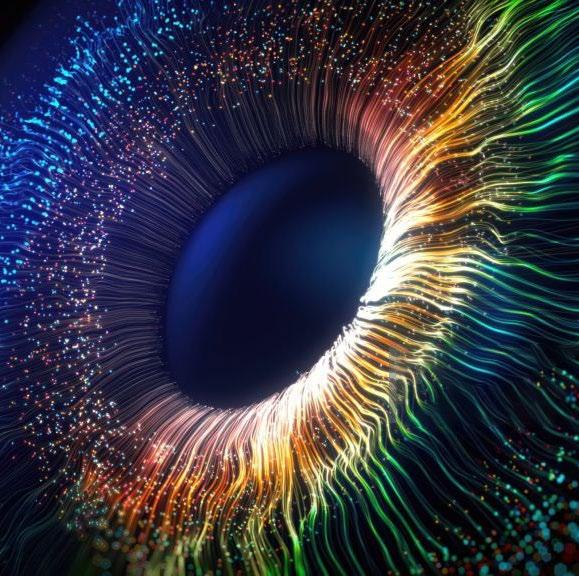
Keck School of Medicine of USC


Keck School of Medicine of USC
2025 Annual Report
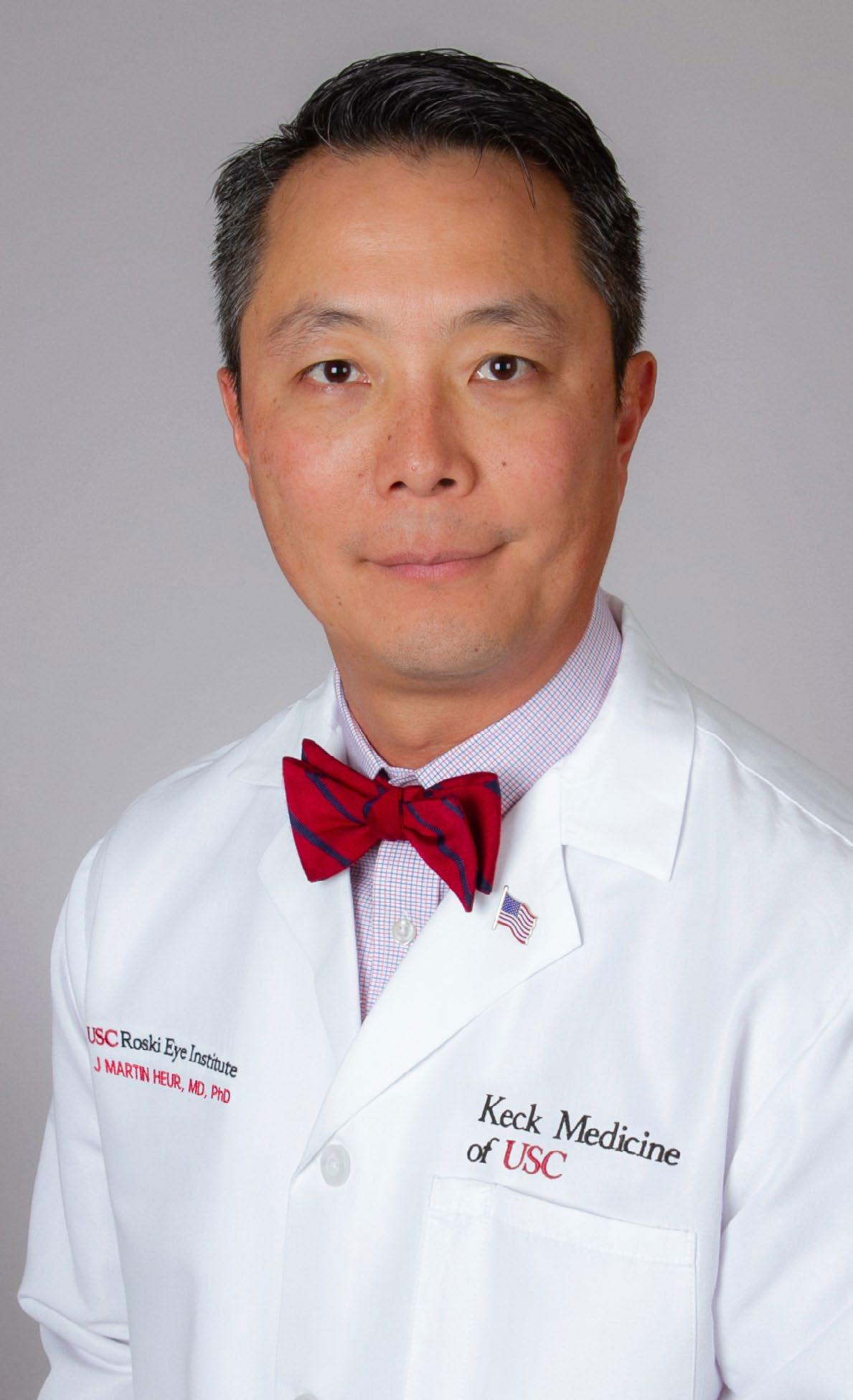
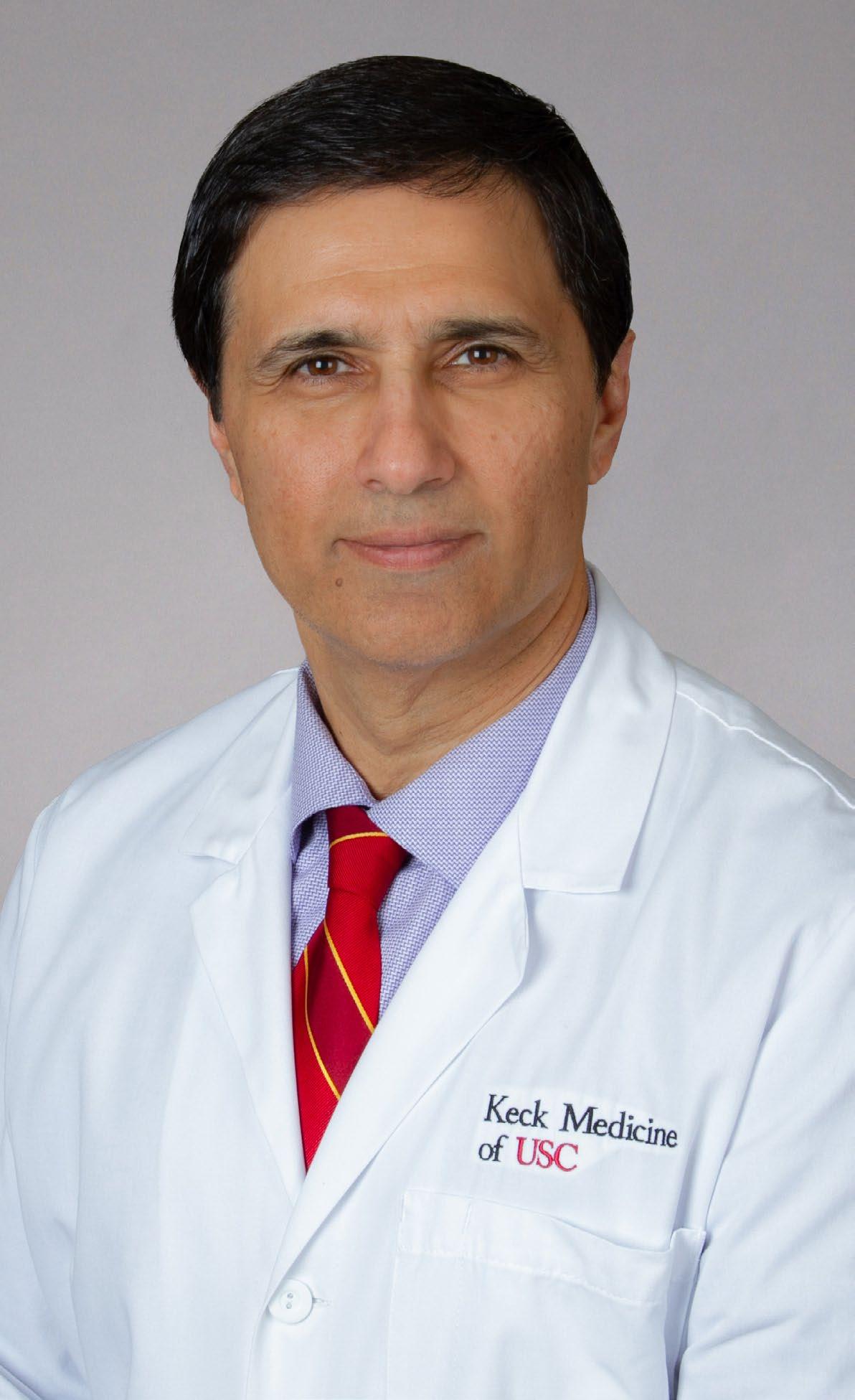
In 2025, the USC Roski Eye Institute furthered our mission of providing exceptional patient care while advancing the field of ophthalmology through innovative research and training programs.
Our commitment to advancing medicine and science enables us to deliver innovative treatments for complex eye diseases that are rarely available elsewhere in the community. This expertise has earned us a reputation as the leading referral center for private practice physicians across Southern California, particularly for rare and challenging ocular cases. We remain dedicated to upholding their trust in the coming years.
“… As we look ahead, we remain dedicated to advancing eye care through world-class clinical services, comprehensive training programs, and cutting-edge research.”
In FY 2024, the USC Department of Ophthalmology was ranked #3 nationally in NIH research funding among all ophthalmology departments. This achievement highlights the strength and impact of our faculty’s research programs, which continue to advance therapeutic and diagnostic innovations that shape the future of eye care.
The USC Ophthalmology Residency Program remains strong and continues to earn national
J. Martin Heur, MD, PhD
Professor and Chair
Grace and Emery Beardsley
Professor of Ophthalmology
Co-Director, USC Roski Eye Institute
USC Department of Ophthalmology
Keck Medicine of USC
recognition. In July 2025, USC entered into a new Medical School Affiliation Agreement with Los Angeles General Medical Center (LAG). This partnership ensures that our residents continue to benefit from the exceptional training setting at LAG, which is supported by USC faculty, LAG-employed clinicians, and USC voluntary faculty. We are especially grateful to our distinguished alumni, who serve as voluntary faculty and generously contribute their time and expertise. Their mentorship and guidance play a vital role in shaping the next generation of ophthalmology leaders.
None of these achievements would be possible without the exceptional collaboration and dedication of our entire USC Roski Eye Institute community. We extend our heartfelt gratitude to everyone who has contributed to supporting our mission.
As we look ahead, we remain dedicated to advancing eye care through world-class clinical services, comprehensive training programs, and cutting-edge research.
Mark S. Humayun, MD, PhD
University Professor
Slivinski Chair in Macular Degeneration Research Director, USC Ginsburg Institute for Biomedical Therapeutics
Co-Director, USC Roski Eye Institute
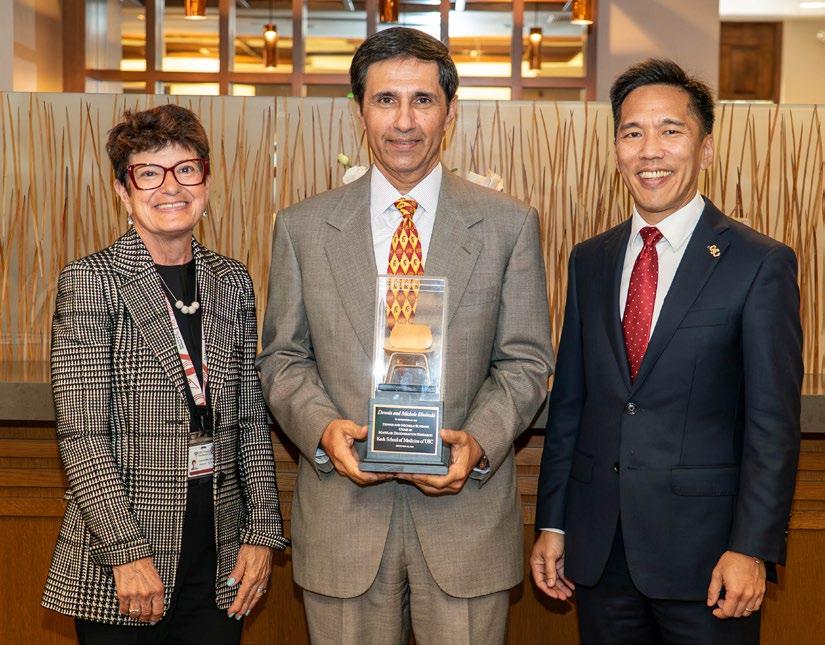
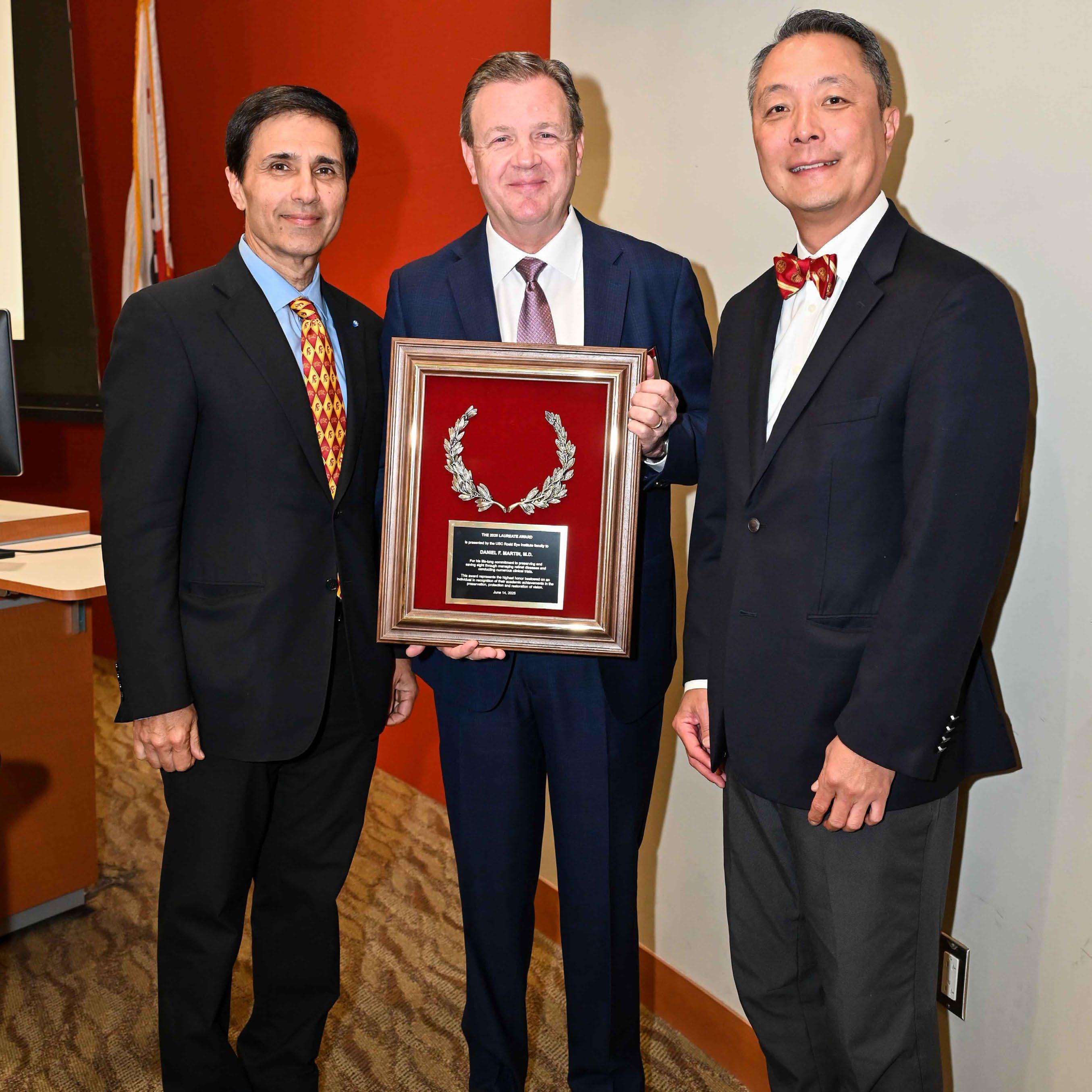
Mark Humayun, MD, PhD, (pictured with Dean Carolyn Meltzer of the Keck School of Medicine of USC and USC Interim President Beong-Soo Kim) was installed as the Dennis and Michele Slivinski Chair in Macular Degeneration Research. Dr. Humayun is the co-inventor of Argus II, which offers functional sight to those with complete retinal blindness. He was elected to the prestigious National Academy of Medicine and National Academy of Engineering for his pioneering work to restore sight.
Faculty, alumni, and guests gathered on Saturday, June 14th, 2025, to celebrate 49 years of excellence in ophthalmic care at USC.
Nearly five decades of groundbreaking eye care came into focus Saturday, June 14, 2025, as the USC Roski Eye Institute marked its 49th year of ophthalmic excellence. The annual symposium connected faculty, alumni and guests through presentations on newly approved treatments and emerging therapeutic approaches.
“The Annual Symposium gives our faculty, many of whom are key opinion leaders, an opportunity to showcase their ground breaking work,” said Dr. J. Martin Heur, Chair of the Department of Ophthalmology.
During the symposium, the USC Roski Eye Institute presented three awards:
• Hiroshi Goto, MD, PhD received the 2025 Narsing A. Rao MD Endowed Lecture Award for his groundbreaking basic and clinical research in pathogenesis, diagnosis, and treatment of VogtKoyanagi-Harada disease, sympathetic ophthalmia and viral uveitis, and ocular tumors.
• Daniel F. Martin, MD, received the 2025 Laureate Award for his life-long commitment to preserving and saving sight through managing retinal diseases and conducting numerous clinical trials. The award represents the highest honor bestowed on an individual in recognition of their academic achievements in the preservation, protection, and restoration of vision.
• David A. DiLoreto, Jr., MD, PhD, received the 2025 Distinguished Alumni Award in recognition of his dedicated service and commitment to excellent in resident and fellow education.
Highlighted topics featured at the symposium included: Artificial Intelligence and Glaucoma Detection; Saliency Analysis of Eye Tracking Using Generative AI to Assess Cortical Visual Impairment Severity; What We’ve Learned About Uveitis from Big Data; Telehealth and Pediatric Eyecare; Gene Therapy for Retinal Degenerations; Endpoints for Geographic Atrophy; Bringing Aqueous Tumor Markers to Clinical Care; Artificial Retinal Implants for Vision Restoration; Whole Eye Transplantation; and Optic Nerve Regeneration.
The USC Roski Eye Institute welcomed surgeons, fellows and residents from around the world June 6-7 for one of the most sought-after oculoplastics training programs in the United States.
The USC Roski Eye Institute welcomed surgeons, fellows and residents from around the world June 6-7 for one of the most sought-after oculoplastics training programs in the United States: “The
Cutting Edge: The USC Oculofacial Plastic Surgery Surgical Skills Course.”
Now in its seventh iteration since 2015, the course is held every 18 months and has rapidly gained recognition for its unique approach to surgical education. Unlike traditional surgical skills courses that rely on videos or simulation devices, The Cutting Edge provides participants with the opportunity to practice on fresh human tissue, offering an authentic learning environment.
The course audience includes trainees from plastic surgery, ENT head and neck, and oculofacial plastic surgery, both at the training level and even afterwards in practice. This mix of specialties bridges the divide and enhances everyone’s learning.
“We keep this course truly cutting edge, by incorporating new techniques and the latest
technology,” said Sandy Zhang-Nunes, MD, founder and course director of The Cutting Edge and clinical associate professor of ophthalmology (voluntary) at USC. “We bring diverse faculty together for a meeting of the minds and hands.”
The two-day program is designed to maximize both learning outcomes and tissue conservation. Day one begins with blepharoplasty and canthoplasty techniques, filler injections, optic nerve sheath fenestration procedures, then moves on to orbital decompression and orbital plating; while day two concludes with corneal neurotization, endoscopic DCR, aesthetic brow lifting, facial fat transfer, and advanced face-lifting techniques.
“The course is structured for participants at all levels of training,” said Dr. Ava Torjani, an ophthalmology resident.
The course audience includes trainees from plastic surgery, ENT head and neck, and oculofacial plastic surgery. The Cutting Edge continues to attract international attention as medical professionals seek advanced training opportunities.
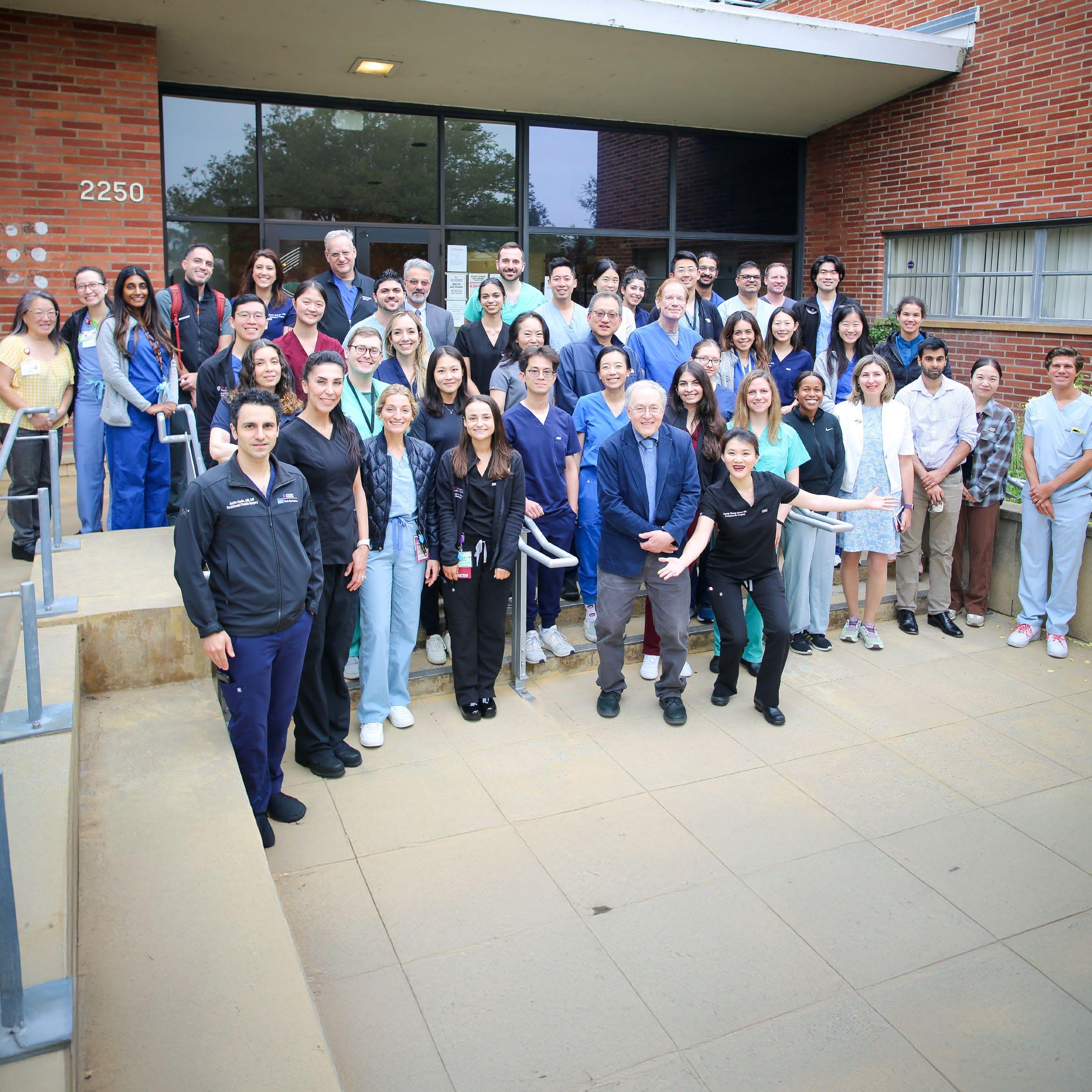
Surgeons, Fellows and Residents from Around the World Gathered at the Health Sciences Campus for the Two-Day Course (Photo/Eric Weintraub)
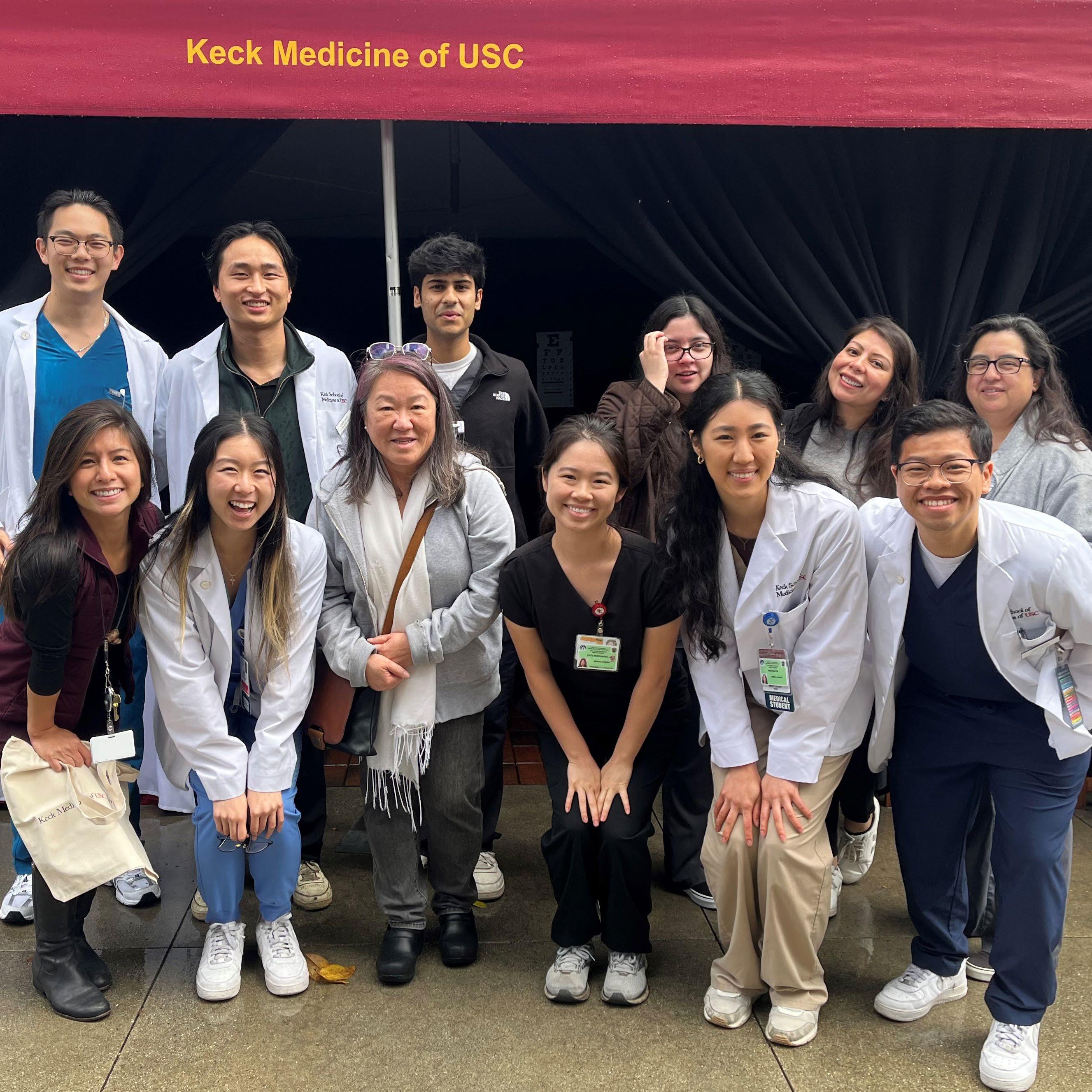
Roski provided 100 vision screenings to attendees at the 2025 LA Times Festival of Books.
The USC Roski Eye Institute provided 100 free vision screenings to attendees at the Los Angeles Times Festival of Books held Saturday, April 26, 2025 on USC’s University Park Campus.
Volunteers from Roski set up the booth at the festival’s Hero Complex row, where staff and medical students fielded questions from attendees while physicians provided medical advice.
“We saw a lot of patients, especially patients with cataracts and things that should get worked up,” said Kyle Bolo, MD, Assistant Professor of Clinical Ophthalmology. “It was a very productive day.”
The annual literary event also offered USC medical students practical experience administering basic eye exams to community members.
“It’s great to apply what I’m learning in medical school and give back,” said Chris How, a secondyear USC medical student. “This event gives me the chance to spend time with classmates and faculty and get to know the people in my community.”
Festival attendees left with information about prescription glasses, various eye conditions and treatment options – especially essential information for attendees without health insurance.
Madi Dela Gente, a USC undergraduate majoring in neuroscience who works as an optometric technician in the USC Village eye clinic, emphasized the importance of community outreach.
“I think it’s really important to provide screenings and interventions to the local community, increasing accessibility healthcare-wise,” she said. “I appreciate interacting with patients and giving back to the community. The LA Times Festival of Books is always a fun event and I’m excited I get to be a part of it.”
Ophthalmology held its inaugural Resident Research Day to showcase graduating senior research.
The USC Roski Eye Institute held its inaugural Resident Research Day on June 13, providing graduating senior residents an opportunity to showcase research conducted during the past academic year.
Kimberly Gokoffski, MD, PhD, opened the program with a presentation emphasizing the importance of research work amongst residents and physicians. “You are the ones who know what research questions to ask,” Gokoffski said. “You are the ones that are uniquely positioned to know what medical needs are out there, what solutions are plausible, and which conditions should be prioritized.”
Third-year resident Yicheng Bao, MD, began the resident portion of the event by presenting his study on oral doxycycline treatment for ocular syphilis. Bao said he was motivated by treating patients at Los Angeles General Medical Center who required inpatient IV penicillin despite critical bed shortages during the COVID-19 pandemic.
“The lack of inpatient availability highlighted the need for effective outpatient alternatives in a lowresource setting,” Bao said.
Dr. Victor Eng, also a third-year resident, presented two-year outcomes for patients with diabetic vitreous hemorrhage. “My project was inspired by the most common diagnoses we encounter on [Emergency Department] consults,” Eng said.
Third-year resident Dr. Mark Phillips discussed agreement and accuracy in distinguishing papilledema from pseudopapilledema among pediatric neuro-ophthalmologists.
Dr. Alexander Tseng concluded the resident presentations with research on ethnic differences in intraocular pressure determinants. “We identified significant interaction effects between ethnicity and certain factors in relation to their effects on intraocular pressure.”
The research day took place the night before the residents’ commencement ceremony as they prepared to begin subspecialty training programs across the country.
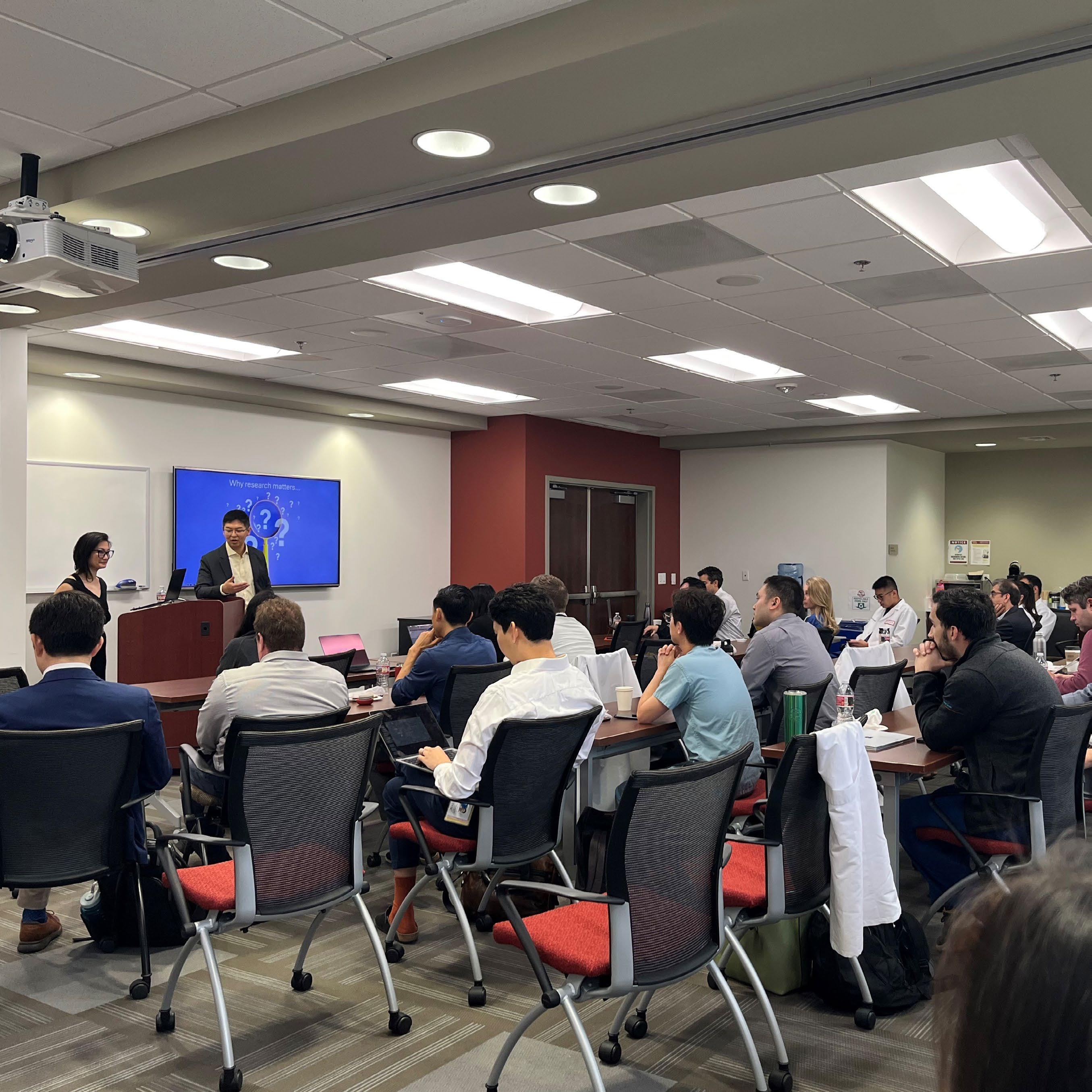
The Department of Ophthalmology at the Keck School of Medicine, ranked #3 in NIH funding, is dedicated to pioneering groundbreaking solutions in vision care. Our distinguished faculty are empowered to lead innovative research, shaping the future of ophthalmology and enhancing patient care.
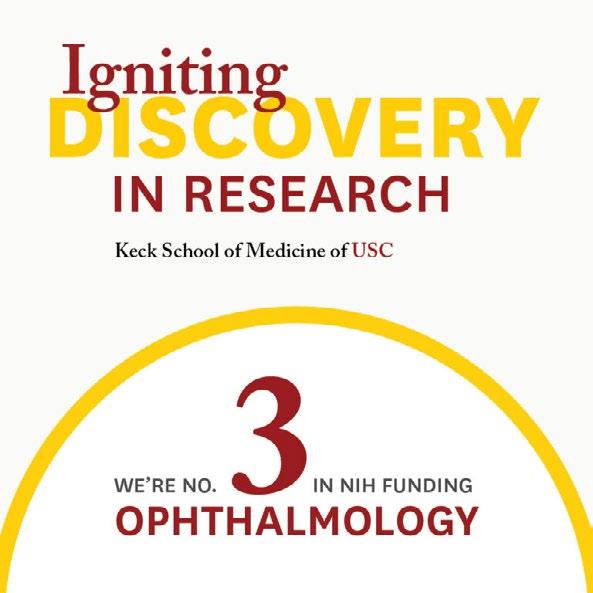
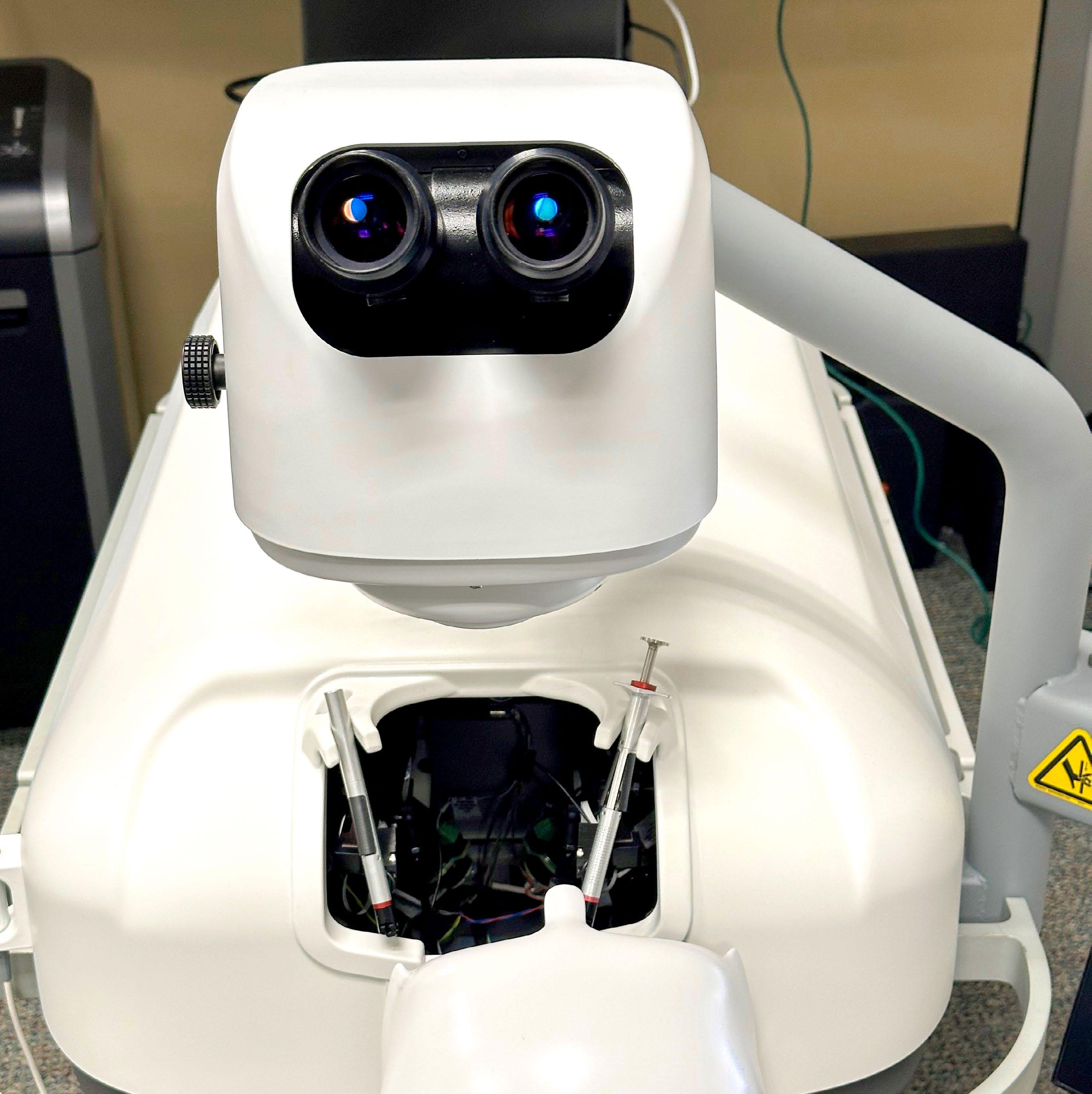
USC Roski Eye Institute’s new HelpMeSee Surgical Simulator trains ophthalmology residents in cataract surgery, improving skills before actual patient procedures.
The USC Roski Eye Institute has become one of the first medical education institutions in the country to acquire a HelpMeSee Surgical Simulator to train ophthalmology residents in cataract surgery techniques. The institute acquired the machine in the fall of 2024, replacing an older EyeSi Simulator previously used for training.
Residents currently use the simulator during their Glaucoma rotation under the supervision of Brian Song, MD, MPH, director of the USC Department of Ophthalmology Residency Program. This scheduling often allows second-year residents to practice their cataract surgical skills in a supervised simulated environment before performing their actual cataract surgery later in the week.
“Having an attending observe has been amazing, as you get real-time feedback on how to
improve,” said Victoria Wang, MD, a second-year ophthalmology resident.
The simulator allows residents to encounter surgery complications in a low-stress environment before encountering them with real patients. With features designed to mimic surgical conditions, the simulator provides tactile feedback during procedures.
“The feedback feels very advanced compared to the simulator we had previously,” said Kimberley Yu, MD, a second-year ophthalmology resident.
“The machine provides feedback and resistance based on if you’re making a simulated incision into the cornea correctly,” added Dr. Song.
“I found it helpful to practice steps such as the capsulorrhexis,” said Dr. Yu. “I felt much less nervous doing the procedure for real once I’d practiced the step a few times on the simulator. It’s a great resource that helps build confidence and familiarity.”
PGY-4
Andrew Duong, MD
Kendra Hong, MD
Samantha Madala, MD
Charlene Tran, MD
Joseph Tran, MD
Victoria Wang, MD
Kimberly Yu, MD
PGY-3
Serena Choi, MD
Rahul Dhodapkar, MD
Micalla Peng, MD
Haroon Rasheed, MD
Jasmine Serpen, MD
Ava Torjani, MD
Jenay Yuen, MD, MPH
PGY-2
Bradley Beatson, MD
Bryana Banashefski, MD
Karen Gutierrez, MD
Brandan Kao, MD
Sarah Pike, MD
Jacob Sperber, MD
Clare Teng, MD
David Younessi, MD
PGY-1
Timothy Do, MD
Jamie Karl, MD
Alexander Lieu, MD
Sophia Sidhu, MD
Shreya Sirivolu, MD
Alexander Suh, MD
Kristy Yoo, MD
Samuel Asanad, MD – Vitreoretinal Surgery
Yicheng Bao, MD – Vitreoretinal Surgery
Kashif Iqbal, MD – Cornea
Matthew Johnson, MD – Vitreoretinal Surgery
Jun Hui “Aidan” Lee, MD – Vitreoretinal Surgery
Jacob Lifton, MD – Vitreoretinal Surgery
Sarah Martin, MD – Pediatrics
Derrick Wang, MD – Glaucoma
Comprehensive
Paul Kouyoumjian, MD, MS
Karen Morgan, MD
Cornea
J. Martin Heur, MD, PhD
Annie Nguyen, MD
Kristina Voss, MD
Glaucoma
Kyle Bolo, MD
Van Nguyen, MD
Brian Song, MD, MPH
Helen Wu, MD
Benjamin Xu, MD, PhD
Neuro-Ophthalmology
Jeffrey Gluckstein, MD
Ocular Oncology
Jesse Berry, MD
Oculoplastics
Liane Dallalzadeh, MD
Optometry
Allan Drexl, OD
Kent Nguyen, OD, FAAO
S. Greg Panosian, OD
Lernik Torossian, OD, FAAO
Carolyn Wang, OD
Pediatrics
Jesse Berry, MD
Mark Borchert, MD
Angela Buffenn, MD, MPH
Melinda Chang, MD
Thomas Lee, MD
Arlanna Moshfeghi, MD, MPH
Aaron Nagiel, MD, PhD
Sudha Nallasamy MD
Angeline Nguyen, MD
Bibiana Reiser, MD, MS
Farzan Abdolahi, MD
Isaac Asante, PhD
David Cobrinik, MD, PhD
Cheryl Craft, PhD
Maria Edman-Woolcott, PhD
Henry K. Fong, PhD
Sarah Hamm-Alvarez, PhD
Xuejuan Jiang, PhD
Gianluca Lazzi, PhD
Longwei Liu, PhD
PROSE/Specialty Contact Lenses
Gloria Chiu, OD, FAAO, FSLS
Retina
Hossein Ameri, MD, PhD
Rodrigo Brant Fernandes, MD, PhD
Mark Humayun, MD, PhD
Linda Lam, MD, MBA
Sun Young Lee, MD, PhD
Juan Carlos Martinez, MD
Andrew Moshfeghi, MD, MBA
Brian Toy, MD Uveitis
Narsing Rao, MD (Emeritus)
Brian Toy, MD
Biraj Mahato, PhD
Mahnaz Shahidi, PhD
Paul Thompson, PhD
Arthur Toga, PhD
Steven Walston, PhD
Liya Xu, PhD
Qifa Zhou, PhD

USC Roski Eye Institute
1450 San Pablo Street, 4th Floor
Los Angeles, CA 90033
323-442-6335
USC
65 N. First Avenue, Suite 101 Arcadia, CA 91006
626-446-2122
500 N. Central Ave. Suite 400 Glendale, CA 91203
818-583-9500
USC
625 S. Fair Oaks Avenue, Suite 400 Pasadena, CA 91105
626-442-6335
USC
835 W. Jefferson Boulevard Suite 1720
Los Angeles, CA 90089
833-USC-EYES
Children’s Hospital Los Angeles
The Vision Center
4650 Sunset Boulevard
Los Angeles, CA 90027
323-660-2450
Keckmedicine.org/eye